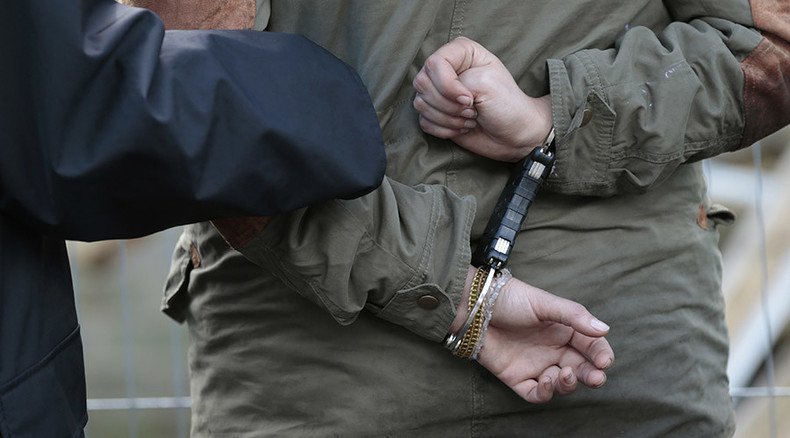‘Jailhouse shakedown:’ ACLU sues Mississippi town that jails poor in debtor’s prison

A lawsuit from the American Civil Liberties Union accuses Biloxi, Mississippi of illegally arresting and jailing poor people without a hearing or representation by legal counsel. The three plaintiffs in the suit were arrested and jailed for failing to pay fines.
“It’s essentially a jailhouse shakedown. Cities across the country, like Biloxi, are scrambling to generate revenue, and they’re doing it off the backs of poor people,” said Nusrat Choudhury, an attorney with the the ACLU’s Racial Justice Program, in a press release.
The suit argues that the city, its police chief, judge, and the for-profit Judicial Correction Services company routinely arrest and jail poor people in an “illegal revenue generation scheme” designed to collect unpaid fines, fees, and court costs imposed in traffic and other misdemeanor cases. Judicial Correction Services is being used by the court as a debt collector, with the company creating payment plans for fined people without consulting them and then asking the court to issue warrants for them if the payments are not made.
Biloxi accused of running "modern-day debtor's prison." https://t.co/udgGpa5NA3@tanzinavega
— Jeanne Sahadi (@jjsahadi) October 21, 2015The complaint was filed in a federal district court in Gulfport, Mississippi on Wednesday. It argues Biloxi violated its plaintiffs’ constitutional rights under the Fourth and Fourteenth Amendments. It also argues that the plaintiffs’ arrests and jail time were not isolated incidents, and that the city has relied on the collection of fines and fees to reach its budget revenue goals.
The ACLU discovered that fines and forfeits in Biloxi had risen 26 percent between the fiscal years of 2008 and 2015, despite the percentage of its population living below the federal poverty line more than doubling from 13.3 percent in 2009 to 27.5 percent in 2013.
Additionally, the ACLU found that a projected $1.45 million in fines and fees had been included in Biloxi’s 2015-16 budget and earmarked to help pay for the mayor’s office, public works, and other municipal expenses.
BREAKING: ACLU & @aclu_ms file lawsuit on behalf of poor people jailed for not paying traffic fines https://t.co/KWOfcvnlUz
#debtorsprisons
— ACLU National (@ACLU) October 21, 2015The three plaintiffs in the suit had been arrested and jailed pursuant to a warrant “charging them with failure to pay fines and court costs they could not afford to pay.” Plaintiff Qumotria Kennedy, a 36-year-old mother of two teenagers, was earning $9,000 a year when she was arrested during a traffic stop and jailed for five nights for unpaid traffic fines.
“Being jailed for not having money was devastating. I hope others don’t have to suffer or be mistreated this way simply because they are poor. It’s just not right,” said Kennedy in the ACLU release.
Plaintiff Joseph Anderson, a man with a disability, was arrested by a police officer who came to his home and was jailed for eight nights for an unpaid speeding fine. Plaintiff Richard Tillery, a homeless man, was arrested and jailed for nonpayment of fines related to misdemeanor offenses on three separate occasions in 2014 for periods ranging from two to 22 days.
“Being poor is not a crime. Yet across America, people are being locked up because they can’t afford to pay traffic fines and fees,” said Choudhury. “This lawsuit seeks to dismantle a two-tiered system of justice that punishes the poorest, particularly people of color, more harshly than those with means in flagrant violation of the Constitution.”
American incomes shrink with no decline in poverty
http://t.co/bZaKnA7okRpic.twitter.com/J3HuGPJxLi
— RT America (@RT_America) September 18, 2015Biloxi spokesman Vincent Creel told Reuters that the city “treats all defendants fairly under the law,” and that its courts have ordered community service for people who could not pay their fines.
“We believe the ACLU is mistaken about the process in Biloxi,” Creel added.
However, the US Supreme Court ruled more than 30 years ago that locking people up merely because they cannot afford to pay court fines violates the 14th Amendment to the US Constitution. The court made it clear that judges cannot jail someone for failure to pay without first considering their ability to pay, efforts to acquire money, and alternatives to incarceration.
1 in 5 US children live below poverty line, more than during Great Recession – report http://t.co/HKkngI7pBnpic.twitter.com/NFLH3aRMOh
— RT America (@RT_America) July 21, 2015The ACLU and Southern Poverty Law Center have investigated other cities and towns that were found to be trying to raise money by collecting unpaid court fees imposed in traffic and other misdemeanor cases. The ACLU has filed a similar lawsuit in Washington State, while its suit in Georgia has led to systemic reform.












